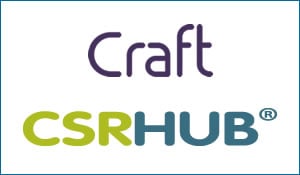By Jana Petrikova
Several times we have been asked how to use CSRHUB to do benchmarking. One approach to this would be to look at a controversial, but well-known and well-studied company, such as Monsanto
CSRHUB has 23 data sources for Monsanto including socially responsible investment data (Asset4, IW Financial, RiskMetrics, Trucost, and Vigeo), standards organizations (GRI), government organizations (UNGC), NGOs (CDP, Human Rights Campaign, BSR, Covalence, Hispanic Magazine), crowd-based sites (Newsweek, Fortune), and product level, certification, supply chain sources (CDP is working with Sustainability Consortium). Together, these sources include over 500 pieces of information on Monsanto’s behavior. However, these data points reflect significant variations in perspective.
For example, GovernanceMetrics International, RiskMetrics Intangible Value Assessment and the RiskMetrics Global Compact + ratings—all related to governance—vary somewhat significantly. Other examples of inconsistencies appear in ranking lists. In 2010, Monsanto was named one of CR Magazine's 100 Best Corporate Citizens. At the same time, Monsanto ranked last on the list of “Most Ethical Companies” produced by Swiss research firm Covalence. While Monsanto has been a member of Business Social Responsibility (BSR), a group of companies committed to improving their sustainability performance, the company ranked at the bottom of Newsweek’s “Green Rankings 2010: U.S. Companies”.
One reason for discrepancy among sources may be the different perspectives that CSR sources or CSR ratings users represent. For example, Monsanto is a pioneer in genetically modified organism (GMO) technologies. Some people and groups oppose GMOs based on the belief that they are harmful to human health and the ecosystem. Other groups believe that GMOs are reasonably safe and represent a great opportunity for reducing hunger through the improvement of agricultural productivity.
Another example came in 2011, when Monsanto received a 100% score from The Human Rights Campaign Foundation for supporting lesbian, gay, bisexual and transgender workplace policies and benefits. Many would find this a great victory. But there are others who do not feel companies should aspire to a leadership position in this area or are even opposed to company progress when it comes to issues of sexual orientation.
CSRHUB addresses different perspectives in two ways. First, we try to remove factual differences by comparing the variations among our sources and normalizing our data. Secondly, users can create a personal profile, which enables them to create their own relative priority scale for CSR dimensions (Community, Employees, Environment, or Governance) and set their position on various special issues.
Monsanto gets an overall rating in our system of 46 from the average member of the CSRHUB community. If, for example, you gave Monsanto a “positive opinion” for its stance on diversity, its overall score would edge up.
How does Monsanto’s 46 score compare to the industry? The average Agriculture and Mining Industry score is also 46, which means that Monsanto’s overall score is exactly average compared to companies in its industry.
 We see some interesting divergence when looking at companies competing with Monsanto in specific business segments. Syngenta (based in Switzerland) is also a leader in crop protection and sale of high-value commercial seeds and gets a score of 62. Agrium (based in Canada), an agricultural retailer and fertilizer producer, receives a 63. What do these ratings tell us and why do the two companies rate higher than Monsanto? These two companies are not as well known as Monsanto. Do they avoid scrutiny by being off the radar screen of raters? Our data suggests otherwise. We have 15 and 13 data sources respectively for Syngenta and Agrium—plenty to be the basis for meaningful comparison.
We see some interesting divergence when looking at companies competing with Monsanto in specific business segments. Syngenta (based in Switzerland) is also a leader in crop protection and sale of high-value commercial seeds and gets a score of 62. Agrium (based in Canada), an agricultural retailer and fertilizer producer, receives a 63. What do these ratings tell us and why do the two companies rate higher than Monsanto? These two companies are not as well known as Monsanto. Do they avoid scrutiny by being off the radar screen of raters? Our data suggests otherwise. We have 15 and 13 data sources respectively for Syngenta and Agrium—plenty to be the basis for meaningful comparison.
When using CSRHUB to contrast and compare companies, it is useful to consider the four broad category scores that underlie the ratings—or for even greater granularity—the twelve subcategory scores available on a deeper data dive. (Category scores are freely available—subcategory scores are only shared with CSRHUB subscribers.) For instance, while Syngenta gets a score of 73 in the Transparency & Reporting subcategory and Agrium gets a score of 68, Monsanto scores only 46. An examination of the inputs for Monsanto’s score reflects claims that it was involved in bribes and corruption, concerns about its policies on the use of its seeds, and reporting deficiencies relating to diversity, community, and the responsibility of its products.
To meaningfully benchmark requires data from a broad range of perspectives. On one level, the more data sources, the better—as long as they are in an understandable and usable format. Both the perspectives and values of each person and the widely varying of perspectives of data sources are in play with benchmarking.
CSRHUB’s data sources, ratings and functionality are focused on being a tool to bring meaning in this context. We hope that CSRHUB can play a role in this process and look forward to hearing any success stories and any suggestions you may offer, for more effective benchmarking.
Inset images courtesy of thegreenpages and Le Monolecte, respectively (CC).


